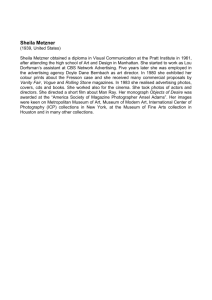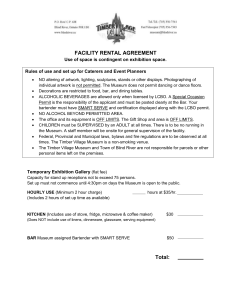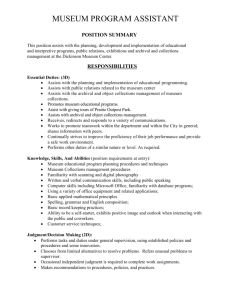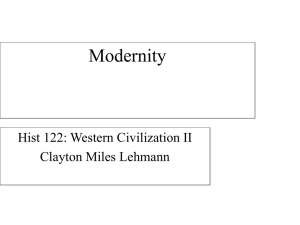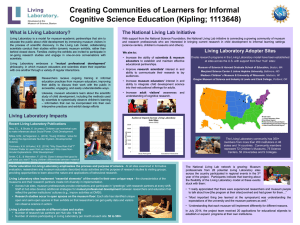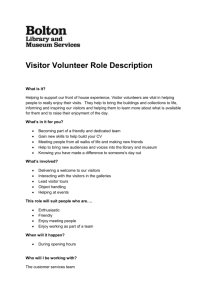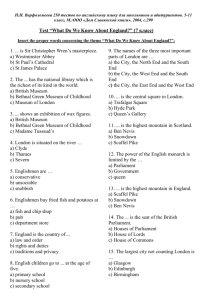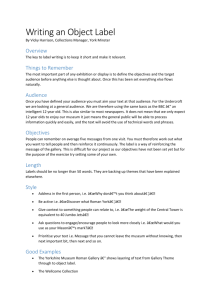Collections Management Policy
advertisement
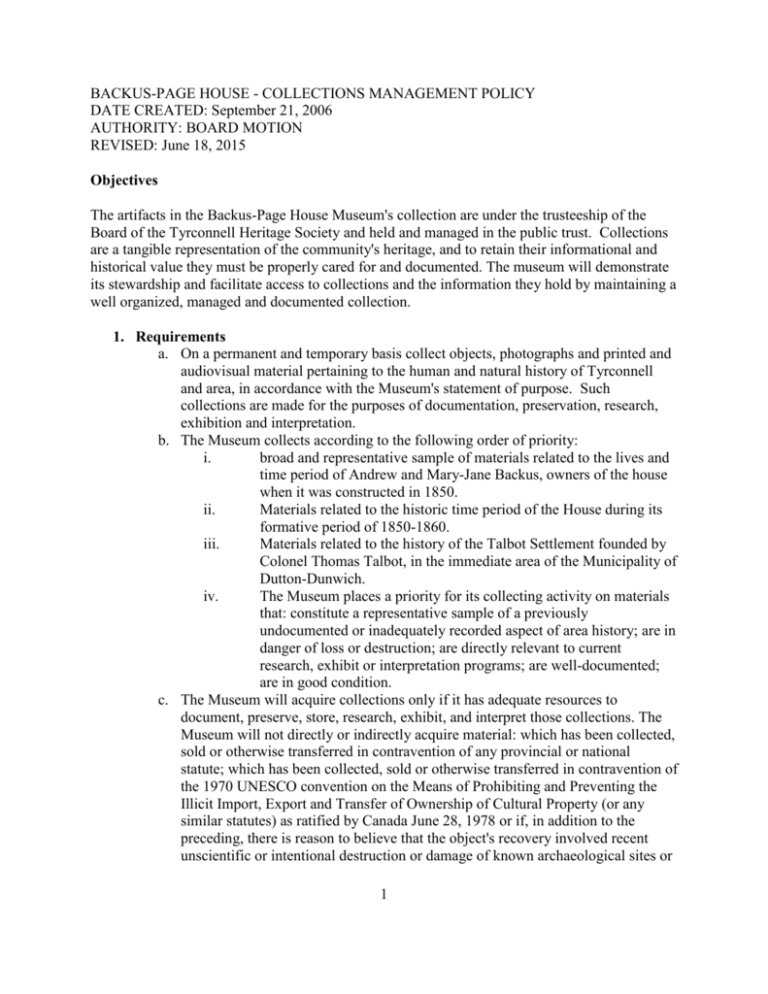
BACKUS-PAGE HOUSE - COLLECTIONS MANAGEMENT POLICY DATE CREATED: September 21, 2006 AUTHORITY: BOARD MOTION REVISED: June 18, 2015 Objectives The artifacts in the Backus-Page House Museum's collection are under the trusteeship of the Board of the Tyrconnell Heritage Society and held and managed in the public trust. Collections are a tangible representation of the community's heritage, and to retain their informational and historical value they must be properly cared for and documented. The museum will demonstrate its stewardship and facilitate access to collections and the information they hold by maintaining a well organized, managed and documented collection. 1. Requirements a. On a permanent and temporary basis collect objects, photographs and printed and audiovisual material pertaining to the human and natural history of Tyrconnell and area, in accordance with the Museum's statement of purpose. Such collections are made for the purposes of documentation, preservation, research, exhibition and interpretation. b. The Museum collects according to the following order of priority: i. broad and representative sample of materials related to the lives and time period of Andrew and Mary-Jane Backus, owners of the house when it was constructed in 1850. ii. Materials related to the historic time period of the House during its formative period of 1850-1860. iii. Materials related to the history of the Talbot Settlement founded by Colonel Thomas Talbot, in the immediate area of the Municipality of Dutton-Dunwich. iv. The Museum places a priority for its collecting activity on materials that: constitute a representative sample of a previously undocumented or inadequately recorded aspect of area history; are in danger of loss or destruction; are directly relevant to current research, exhibit or interpretation programs; are well-documented; are in good condition. c. The Museum will acquire collections only if it has adequate resources to document, preserve, store, research, exhibit, and interpret those collections. The Museum will not directly or indirectly acquire material: which has been collected, sold or otherwise transferred in contravention of any provincial or national statute; which has been collected, sold or otherwise transferred in contravention of the 1970 UNESCO convention on the Means of Prohibiting and Preventing the Illicit Import, Export and Transfer of Ownership of Cultural Property (or any similar statutes) as ratified by Canada June 28, 1978 or if, in addition to the preceding, there is reason to believe that the object's recovery involved recent unscientific or intentional destruction or damage of known archaeological sites or 1 from illegal or clandestine excavations; which has a questionable, undetermined or unethical history of ownership. In addition to the above considerations, acquisition and de-accession of artifacts will be made in light of sensitivity concerning the evolving nature of the relationship between First Peoples and museums. d. Collecting is defined as the acquisition by museum employees and board members of an object similar or related to that which the Museum collects or intends to acquire. All employees and board members are required to declare a conflict of interest when such situations arise. Staff members are required to offer the Museum the first opportunity to acquire objects considered or obtained for a personal collection. e. Meet municipal, provincial, and federal legislative requirements including: In situations where copyright is of relevance, the Museum will respect the provisions of the Copyright Act (1970, c.30; 1988 c.30, Bill C 32, 1997). The Museum will also respect the provisions of the Ontario Heritage Act (1974 & 2004). Also, the Museum respects the Freedom of Information Act as pursuant to the Municipal Act, R.S.O., 1990 Chap. M 45, the Firearms Act (1995 C. 39), the Occupational Health and Safety Act and the Wild Animals and Plant Protection Regulation of the International and Interprovincial Trade Act (WAPPRITA), 1992. 2. Acquisitions a. Objects are acquired by donation, purchase, bequest or exchange. b. Decisions regarding acquisitions by donation are made by the Cultural Manager except in the following cases: i.) objects that the Cultural Manager feels unsure of with respect to meeting the Collections Mandate or the Criteria for Collecting. ii.) all firearms iii.) culturally sensitive items In these instances, the Cultural Manager and Board of Directors will meet to decide to access or not to access the item(s) in question through a simple majority vote of the Board members present. c. The Cultural Manager reports all acquisitions to the Board via the Cultural Manager’s report and to the public through the museum website. d. All acquisitions involving transfer of ownership and/or responsibility must be accompanied by a signed gift form or other proof of legal titles to the object, such as a transfer of title form or bill of sale. e. Acquisitions by purchases below $500 may be made by the Cultural Manager from the available accessions funds. Acquisitions by purchase exceeding $500 and below $1000 will be made from the accessions funds available upon approval of a purchase order by the Cultural Manager and President of the Tyrconnell Heritage Society. Any acquisitions by purchase exceeding $1000 require the approval of the Tyrconnell Heritage Society Board of Directors. f. For purchases, the museum staff should receive a bill of sale, with the name, 2 address and telephone number of the vendor clearly visible. Purchases should be made in the name of the Tyrconnell Heritage Society. g. If for any reason objects which are important to the purposes of the Museum cannot be collected, the Museum will endeavour to make a complete documentary record of those materials using printed, visual and audio media. h. Bequests are considered for acceptance or rejection in the same manner as other acquisitions by donation to the Museum. i. No acquisition will be made where the conditions of acquisition may restrict the use or disposition of that object in fulfilling the goals of the Museum. If restrictions are attached to an acquisition, a reasonable date will be set for their termination. However, if the Cultural Manager determines that the artifact is of utmost importance to the collection and the potential donor insists on certain conditions, the donation will be considered for approval by the Tyrconnell heritage Society Board of Directors. 3. Collection Use and Integrity a. The Museum will encourage maximum use of its collection to the extent that the integrity of the collection is not compromised and the use remains consistent with the overall goals and ethics of the Museum. It is recognized that deterioration and destruction of some objects may occur within the course of normal museum operation. The Museum may acquire objects for its educational and interpretation collection that do not become a part of the permanent collection and are not subject to its provisions. b. To ensure the integrity of the permanent collection, the Museum collects and manages objects separate from the permanent collection to be used for the purpose of enhancing the learning experience during a museum visit, school program, travelling exhibition or living history event. Priorities for an education and interpretation collection are described in the Education and Interpretation Policy. The permanent and education collections are made available to the public for research purposes. 4. Deaccessioning refers to the permanent removal of collection materials which have been acquired on a permanent basis. In order to maintain a growing collection in accordance with the goals and priorities of this Collections Management Policy, it may be necessary, from time to time, to deaccession materials. The decision to deaccession material must be recommended by the Cultural Manager and approved by the Board of the Tyrconnell Heritage Society. In deaccessioning material from the permanent collection, the Museum will adhere to the following standards: i. The Museum will not acquire materials with the definite intention of eventual deaccession. ii. Collections which have been expended through use or which have minimal value or significance to the Museum may be intentionally deaccessioned. Other criteria for deaccessioning include poor quality, poor condition, duplication and the possibility of upgrading the collection by exchange or 3 other transaction. iii. Collections may be deaccessioned for the purpose of exchange, or gift to another tax exempt, non-profit, educational institution dedicated to the preservation of cultural heritage. Second consideration will be given to disposal through online sales (eg. Kijiji.ca) or public auction advertised in the appropriate media. Of objects not sold, third consideration will be given to disposal through a dealer. iv. The Museum will deaccession collections for the purpose of repatriation, when it can be shown that another body or government has a right to the material. v. In the event of accidental loss or destruction, a report in writing to the Board will be made by the Cultural Manager. vi. The Museum will do its utmost to insure that deaccessioned collections which are significant to the cultural heritage of Ontario and Canada are retained in Canada. vii. The Museum will do its utmost to insure that deaccessioned collections remain in the public trust. viii. Deaccessions will adhere to the applicable provincial and Canadian laws and international agreements and treaties. ix. Prior to deaccessioning, the materials will be thoroughly researched and documented (except as prohibited by accidental loss or destruction), on standardized forms. These records will be maintained by the Cultural Manager as a permanent public record. x. Where the deaccession involves the transfer of ownership or responsibility, appropriate documents or records will be used. xi. Prior to deaccession through intentional discard, sale, trade or exchange or gift, the fair market value of the object shall be determined, if necessary, by an independent appraisal. xii. Funds resulting from a deaccession (i.e. proceeds from a sale, funds from an insurance claim) shall be retained for collections acquisition or conservation. 5. Loans a. All loans must have a signed incoming or outgoing loan agreement. b. All loan agreements must have an expiry date listed. c. All loaned or borrowed material is covered by a special insurance rider, from the moment of arrival on site to the time of its departure from the site. d. All borrowed material is handled and cared for according to current museum standards. e. The Cultural Manager informs the owner(s) of a borrowed artifact, in writing, of any damage or suspected damage as soon as it is noticed. f. The Museum does not repair, alter or modify any borrowed material without the written permission of the owner(s). g. The Museum returns all borrowed material at the conclusion of the time period stipulated on the signed loan agreement. If the Museum wishes to extend the 4 terms, a new loan agreement is negotiated prior to the conclusion of the original loan agreement. h. The museum loans materials for exhibition, research, or education purposes at the discretion of the Cultural Manager. 6. Appraisals The Museum will not provide appraisals for tax-deduction or other external purposes. Where objects are being offered for the permanent collection, the museum may assist donors in obtaining appraisals for tax-deduction purposes, but will not pay for the cost of the appraisal unless approved by the Tyrconnell Heritage Society Board of Directors. 7. Collection Records a. Staff and volunteer are trained on current conservation standards in the labelling, care and handling of artifacts b. The Cultural Manager assumes the overall responsibility for the management of the collections with the assistance of staff and volunteers. c. Adequate time, workspace and funding for collections management activities is provided. d. A budget line is provided in the annual operating budget for the acquisition of objects, their cataloguing, storage and care. e. The museum uses an effective collection documentation system and shall adhere to the standard recognized 3-part numbering systems for the permanent and education collections. An accession register, a master catalogue file, and signed donor and loan forms are utilized. f. The Cultural Manager is responsible for keeping a periodically updated paper or electronic copy of the collection records off-site in a secure location. g. The museum's collection records are kept current by the Cultural Manager or designate. h. The Museum will cooperate with other museums, institutions and agencies, especially those located in Elgin County. 5
